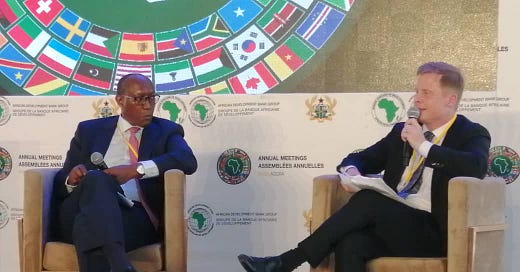African countries urged to transition towards circular economy
Circular economy is a model of production and consumption involving sharing, leasing, reusing, repairing, refurbishing and recycling existing materials and products for as long as possible
CIRCULAR ECONOMY - AfDB Vice Kelvin Kanina Kariuki captured in this file photo during a circular economy briefing with the press at the bank’s 2022 annual meetings in Accra, Ghana (Photo - Planet Defence)
HELSINKI, Finland (Planet Defence) - The 2023 World Circular Economy in Helsinki, Finland, organized by the Finnish Innovation Fund Sitra, brought together 2000 participants from 156 countries including business and government leaders, policymakers and experts from around the world.
Circular economy is a model of production and consumption involving sharing, leasing, reusing, repairing, refurbishing and recycling existing materials and products for as long as possible. Participants presented the world’s best circular economy solutions.
Some African government ministers and representatives from the Ministries of Environment attended on behalf of their governments, including Zambia, whose Minister of Small and Medium Enterprise Development, Elias Mubanga, urged African countries to begin transition to embed circular systems swiftly.
“In Africa we have what it takes to deliver on the circular transition, and we will deliver,” Mubanga said in an interview.
Dr. Anthony Nyong, Director for Climate Change and Green Growth, led the African Development Bank delegation to the forum.
During his participation in several events, Nyongo made the observation that tapping domestic resources, with support from local banks, will be critical for enabling Africa’s circular transition.
According to Nyong, “The right legal and policy foundations need to be created by the national governments to encourage money to flow to circular economy solutions.”
Through the Africa Circular Economy Facility (ACEF), a multi-donor trust fund, the African Development Bank is supporting five African countries to develop national roadmaps to enable the transition to a circular model.
“It is important that the road mapping process is inclusive to result in locally owned sustainable results,” Nyong added.
ACEF also supported the African Circular Economy Alliance’s (ACEA) participation in the forum.
ACEA is a collaborative platform that coordinates and links various circular economy initiatives across the continent.
ACEA, the African Development Bank and the African Circular Economy Network (ACEN) organized an accelerator session on circular economy in Africa to highlight the continent’s progress on the circular transition.
The event covered three key topics: circular economy and resource efficiency in Africa’s mining and nature-based sectors; establishing a common approach to standards for plastics design and recycling in Africa; and Regenerative Food Systems in Africa.
Source : AfDB Website




